Suchergebnisse für "Factsheet%3A Energietechnologien gestalten%2C die f%C3%BCr alle sinnvoll und nutzbar sind"
Digitization in the construction industry
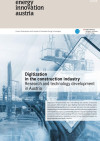
Research and technology development in Austria
energy innovation austria
4/2018
Herausgeber: BMVIT und Klima- und Energiefonds
Englisch, 8 Seiten
Downloads zur Publikation
University Plus-Energy Office High-Rise Building
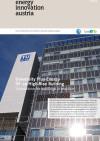
Innovations for buildings in practice
Herausgeber: BMVIT und Klima- und Energiefonds
Englisch, 8 Seiten
Downloads zur Publikation
LifeCycle Tower - Energy efficient prefabricated multi-storey timber houses
Based on the results of previous research projects, the project at hand deals with the development of a wooden prefabricated module construction for energy efficient office buildings with up to 20 storeys. This sustainable system ensures cost certainty through the whole life cycle of the building.
IEA Bioenergy Task "GHG Balances"
Participation in the investigation net of the IEA Bioenergy to greenhouse gas balance of biomass and bioenergetics systems as well as coordination of the Austrian participation in IEA Bioenergy.
Presentation of the effective use of innovative bioenergy technologies in the Austrian energy system of the future (BioEff)
The study shows possibilities and strategies for the effective use of innovative bioenergy technologies in Austria.
Digitalization in Urban Planning: From Spatial Energy Planning to Digitalization in Construction Engineering (PBM_integrativ)
The project provides a comprehensive overview of conditions and interrelations between administration, economy and planning and to elaborate the most important features and deficits in the flow of relevant information between the different phases of a building’s life cycle - planning, construction and management/administration.
Life Cycle Cost Forecasting Model - Real Estate-Database analysis for life-cycle based investment decisions
Estimation of operational costs of buildings based on a "cause/effect model" between technical building characteristics, investment and running costs to support the decision making process in early planning stages regarding energy efficient buildings.
greenWATERrecycling – utilization of greywater for energy recovery and for providing greywater-filtrate for watering green walls
Development of a system for energy-recovery of waste heat of greywater and of greywater-filtrate in ordert o reduce the energy consumption of hot water supply and the water consumption for irrigation.
Photovoltaics - a key technology
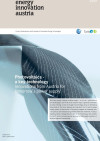
Innovations from Austria for tomorrow`s power supply
energy innovation austria
2/2017
Herausgeber: BMVIT und Klima- und Energiefonds
Englisch, 8 Seiten
Downloads zur Publikation
Innovations for the city of tomorrow
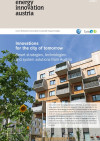
Smart strategies, technologies and system solutions from Austria
energy innovation austria
4/2016
Herausgeber: BMVIT und Klima- und Energiefonds
Englisch, 16 Seiten
Downloads zur Publikation
Bioenergy in the energy system of the future
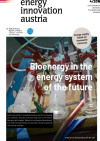
Energy supply based on renewable resources.
energy innovation austria
4/2019
Herausgeber: BMVIT und Klima- und Energiefonds
Englisch, 12 Seiten
Downloads zur Publikation
Energy Innovations made in Austria - The Green Deal for a Climate-Neutral Future
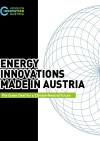
This brochure presents the latest findings in energy research in Austria with examples from cities of tomorrow, decarbonisation of industry, digital transformation and green hydrogen.
Herausgeber: Bundesministerium für Klimaschutz, Umwelt, Energie, Mobilität, Innovation und Technologie (BMK), Klima- und Energiefonds, June 2020
Englisch, 36 Seiten
Downloads zur Publikation
"gugler! build & print triple zero" - subproject 6: Integration of the C2C production into the flagship project Gugler
Print and media production at the media and communications company gugler GmbH are currently being optimized according to Cradle to Cradle (C2C) criteria. The goal of this subproject is to allow the demands of a C2C production process optimized for exchange with biological cycles to be included into the general planning of the new production building of the company, a pilot project within the "building of tomorrow" program line.
e80^3-Buildings - Sub project 1: Basics
Goal of this subproject was to select the building with the highest potential within a building-portfolio. Therefore a criteria catalogue was developed, which is generally applicable.
City Cooling - Intelligent district cooling implementation, Vienna
Development of an intelligent district cooling concept and alternative solutions for heat rejection from central absorption chillers at the example of the neighbourhood TownTown in Vienna.
HEROES - Houses for Energy- and ResOurce Efficient Settlements
A simplified method will be developed for the calculation of environmental indicators for so far not considered building elements (eg. constructions, which are not thermally relevant and HVAC-components). The theoretical principles for the calculation of the primary energy demand and the CO2-Emissions for operating and raising a building will be harmonized.
Circular Economy Compass (KLW-Komp)
The Circular Economy Compass project has developed a responsive online self-assessment tool for the circular economy in SMEs. Based on a theory-based evaluation scheme, it is be possible to determine a company's degree of preparedness for a circular economy at a reasonable cost. To this end, the tool has a computational logic that automatically generates a circularity score (KPI, Key Performance Indicator) based on the answers.
DiCYCLE - Reconsidering digital deconstruction, reuse and recycle processes using BIM and Blockchain
DiCYCLE aims at identifying, analysing and mapping current End-of-Life processes in the building industry, as well as optimizing those for digitalization, using BIM, Blockchain and Smart Contracts. The goal is to enable sustainable digital planning, construction and deconstruction workflows for reuse and recycling of building materials and components along the life cycle.
AR-HES-B – Energy storage, production and recovery of valuable substances in wastewater treatment plants
AR-HES-B develops technologically based concepts of municipal wastewater treatment plants in order to convert them from energy consumers into a hybrid energy provider, energy storage and a provider of resources. The concept enables wastewater plants to turn into an important platform in the regional energy and mass transfer.
EM Städte - Monitoring and evaluation of urban energy flows
In the first phase of the project, the data source of the energy statistics will be analyzed. Based on the findings of the analysis a methodology on build up regional energy balances will be developed. The methodology will be integrated into the Senflusk tool and tested on five reference cities in Austria.
